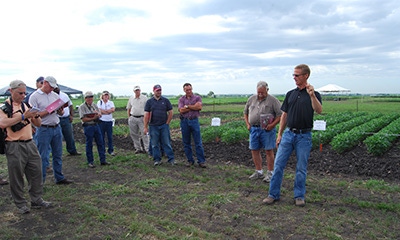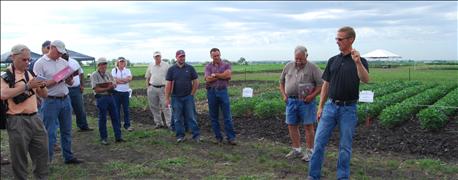
On February 3, 2016, Monsanto announced its commercial launch for soybean varieties resistant to dicamba and glyphosate designated as Roundup Ready 2 Xtend varieties. Monsanto made this announcement following China’s decision to approve grain from these varieties for import. While this new technology can be a useful tool for managing hard-to-control weeds in soybeans, especially weeds resistant to glyphosate and other herbicides, there is a problem. Dicamba is not yet approved for use on soybeans except prior to planting and there is a preplant waiting period for that use.

NOT LABELED: New soybean varieties are being marketed this year with traits that make them resistant to dicamba herbicide. But the herbicide hasn’t yet been approved by EPA to allow its use on soybeans preemergence and postemergence.
There are no labels approved yet for any dicamba-containing herbicide to be legally used on soybeans either at planting (preemergence) or after the soybean crop has emerged (postemergence). Furthermore, it’s uncertain whether federal and state labels will be granted in time to allow application of dicamba-containing products on these soybean varieties during the 2016 growing season.
Dicamba herbicide isn’t labeled yet to apply to soybeans
Without approved labels, applying a dicamba-containing product to these varieties would be a violation of both state and federal laws. Additionally, some grain elevators have indicated they will not accept grain produced from dicamba-resistant soybeans until the stacked trait obtains approval from the European Union.
Iowa State University Extension weed management specialists Mike Owen and Bob Hartzler are concerned about this situation. “We want to make sure Iowa farmers recognize that the trait is available in these designated soybean varieties but the herbicide product is not available,” says Owen. “You need to understand that the older formulation of dicamba which has been used for many years for weed control in corn is still available for corn and is widely used with that crop. But it is not registered for preemergence or postemergence application on soybeans.”
Don’t give in to temptation to apply dicamba to soybeans
Use of dicamba on soybeans is what these new GMO traits Monsanto has developed are going to eventually allow, once the herbicide is registered and labeled for this use. Meanwhile, you don’t want to use a herbicide illegally, you don’t want to get into trouble, notes Owen.
One of the problems that occurred last year in the southern U.S. was some growers, being innovative, decided “dicamba is dicamba.” They went ahead and sprayed dicamba on some of their soybeans and cotton, illegally. “The illegal use of auxin herbicides (dicamba belongs to the auxin herbicide family) was a major problem in the Mississippi Delta last year,” says Owen. “Given the fact that the industry has decided to go forward and make these new traited soybean varieties available without the herbicide approved to be used with them, and given the fact that farmers are looking for new ways to manage herbicide resistance in weed populations, we are concerned.”
When is registration for dicamba use on soybeans expected?
Generic auxin herbicides, such as the dicamba products for corn, are used because of their low cost as a corn herbicide. That’s another reason Owen and Hartzler are worried some farmers may try to use them on the new traited soybean varieties.
When is the registration for the dicamba herbicide product expected to be approved? The answer is someday. Possibly soon. Maybe. Don’t know. That’s because this registration is currently tied up in EPA, seeking approval to be marketed.
We’re now in a period where comments can be written. This has become very controversial because people who are not in favor of herbicides and certainly people who are not in favor of GMOs have been requiring more scrutinizing of this technology. “It’s good to make sure we have the best tools and the safest tools available to control challenging weeds,” says Owen. “But it does put a crimp in some plans of farmers who want to use these tools and this new soybean trait to help control weeds.”
Can you apply dicamba prior to planting the traited soybeans?
Some farmers have asked whether or not dicamba can be applied prior to planting dicamba-resistant soybean varieties. The answer is yes, says Owen, but this type of application must follow current dicamba label guidelines regardless of the soybean variety planted.
For example, following the preplant application of Clarity herbicide (a corn herbicide containing dicamba) and 1 inch of accumulated precipitation, a waiting interval is required prior to planting soybeans. That waiting period is 14 days for up to 8 ounces of Clarity and 28 days for up to 16 ounces. This use pattern is governed by the herbicide label, not by the soybean variety planted.
Common herbicide-resistant weeds will be back in 2016
Herbicide-resistant weed populations continue to be a common occurrence in cropping systems across much of the U.S., according to Owen, Hartzler and Aaron Hager, a University of Illinois weed scientist. In Illinois and Iowa, waterhemp and horseweed (marestail) are the two most common herbicide-resistant weed species. Observations during 2015 suggest these species are likely to remain prevalent in 2016.
Waterhemp resistant to herbicides from more than one site-of-action group are increasingly common, and most weed scientists do not foresee this changing. Recent survey data from Illinois indicated herbicide-resistant waterhemp occurred in close to 90% of the fields sampled, and multiple resistance to glyphosate and PPO inhibitors was confirmed in 54% of the fields sampled.
Use alternative weed control strategies for soybeans
Soybean producers who plan to rely on dicamba and dicamba-resistant soybeans in their 2016 weed management programs for control of glyphosate- and PPO-resistant waterhemp populations are encouraged to consider using alternative strategies. That’s the advice of Owen, Hartzler and Hager.
The Enlist soybean trait technology and the complementary Enlist Duo herbicide formulation have received regulatory clearances, but without export approval to China, Dow AgroSciences will have this seed available in 2016 to be planted only for the purpose of increasing the seed supply.
Summing up: Owen, Hartzler and Hager point out that alternative strategies to manage weed populations that show resistance to multiple soybean herbicides include rotating fields to a different crop, or planting soybean varieties resistant to glufosinate (Liberty Link) and using glufosinate (Liberty) as a postemergence herbicide. Regardless of the crop planted, the variety selected, or the herbicide applied, the most sustainable solution to the challenges of herbicide-resistant weeds is an integrated weed management system that uses both chemical and non-chemical tactics to eliminate weed seed production throughout the growing season.
For more weed management information, visit weeds.iastate.edu.
About the Author(s)
You May Also Like




